- Home
- Nicholas Sparks
Dear John Page 16
Dear John Read online
Page 16
"No, we didn't," she countered. "I worked on houses all day long. Remember?"
She was right, of course. At least partially. I tried again. "I'm not saying it makes much sense, but it seems like we had more time to talk last year."
"And that's what's bothering you? That I'm busy? That I have a life? What do you want me to do? Ditch my classes all week? Call in sick when I have to teach? Skip my homework?"
"No . . ."
"Then what do you want?"
"I don't know."
"But you're willing to humiliate me in front of my friends?"
"I didn't humiliate you," I protested.
"No? Then why did Tricia pull me aside today? Why did she feel the need to tell me that we had nothing in common and that I could do a lot better?"
That stung, but I'm not sure she realized how it came across. Anger sometimes makes that impossible, as I was well aware.
"I just wanted to be alone with you last night. That's all I'm trying to say."
My words had no effect on her.
"Then why didn't you tell me that?" she demanded instead. "Say something like 'Would it be okay if we do something else? I'm not really in the mood to hang out with people.' That's all you would have had to say. I'm not a mind reader, John."
I opened my mouth to answer but said nothing. Instead, I turned away and walked to the other side of the room. I stared out the patio door, not angered so much by what she'd said, just . . . sad. It struck me that I had somehow lost her, and I didn't know whether it was because I'd been making too much of nothing or because I understood all too well what was really happening between us.
I didn't want to talk about it anymore. I was never good at talking, and I realized that what I really wanted was for her to cross the room and put her arms around me, to say that she understood what was really bothering me and that I had nothing to worry about.
But none of those things happened. Instead I spoke to the window, feeling strangely alone. "You're right," I said. "I should have told you. And I'm sorry about that. And I'm sorry about the way I acted last night, and I'm sorry about being upset that you were late. It's just that I really wanted to see you as much as I could this trip."
"You say that like you don't think I want the same thing."
I turned around. "To be honest," I said, "I'm not sure you do."
With that, I headed for the door.
I was gone until nightfall.
I didn't know where to go or even why I left, other than that I needed to be alone. I started for campus beneath a sweltering sun and found myself moving from one shade tree to the next. I didn't check to see if she was following; I knew that she wouldn't be.
In time, I stopped and bought an ice water at the student center, but even though it was relatively empty and the cool air refreshing, I didn't stay. I felt the need to sweat, as if to purify myself from the anger and sadness and disappointment I couldn't shake.
One thing was certain: Savannah had walked in the door ready for an argument. Her answers had come too quickly, and I realized that they seemed less spontaneous than rehearsed, as if her own anger had been simmering most of the day. She'd known exactly how I would be acting, and though I might have deserved her anger based on the way I'd acted last night, the fact that she hadn't appeared to care about her own culpability or my feelings gnawed at me for most of the afternoon.
Shadows lengthened as the sun began to go down, but I still wasn't ready to go back. Instead, I bought a couple of slices of pizza and a beer from one of those tiny storefront places that depended on students to survive. I finished eating, walked some more, and finally began the trek back to her apartment. By then it was nearly nine, and the emotional roller coaster I'd been on left me feeling drained. Approaching the street, I noticed Savannah's car was still in the same spot. I could see a lamp blazing from inside the bedroom. The rest of the apartment was black.
I wondered whether the door would be locked, but the knob turned freely when I tried. The bedroom door was halfway closed, light spilled down the hallway, and I debated whether to approach or stay in the living room. I didn't want to face her anger, but I took a deep breath and made my way down the short hallway. I poked my head in. She was sitting on the bed in an oversize shirt, one that reached to midthigh. She looked up from a magazine, and I offered a tentative smile.
"Hey," I said.
"Hey."
I crossed the room and sat on the edge of bed.
"I'm sorry," I said. "For everything. You were right. I was a jerk last night, and I shouldn't have embarrassed you in front of your friends. And I shouldn't have been so angry that you were late. It won't happen again."
She surprised me by patting the mattress. "Come here," she whispered.
I moved up the bed, leaned against the bed frame, and slipped my arm around her. She leaned against me, and I could feel the steady rise and fall of her chest.
"I don't want to argue anymore," she said.
"I don't either."
When I stroked her arm, she sighed. "Where'd you go?"
"Nowhere, really," I said. "Just walked the campus. Had some pizza. Did a lot of thinking."
"About me?"
"About you. About me. About us."
She nodded. "Me too," she said. "Are you still mad?"
"No," I said. "I was, but I'm too tired to be mad anymore."
"Me too," she repeated. She lifted her head to face me. "I want to tell you something about what I was thinking while you were gone," she said. "Can I do that?"
"Of course," I said.
"I realized that I'm the one who should have been apologizing. About spending so much time with my friends, I mean. I think that's why I got so mad earlier. I knew what you were trying to say, but I didn't want to hear it because I knew you were right. Partly, anyway. But your reasoning was wrong."
I looked at her uncertainly. She went on.
"You think that I made you spend so much time with my friends because you weren't as important to me as you used to be, right?" She didn't wait for an answer. "But that's not the reason. It's really the opposite. I was doing that because you're so important to me. Not so much because I wanted you to get to know my friends, or so they could get to know you, but because of me."
She halted uncertainly.
"I don't know what you're trying to say."
"Do you remember when I told you that I draw strength from being with you?"
When I nodded, she skated her fingers along my chest. "I wasn't kidding about that. Last summer meant so much to me. More than you can ever imagine, and when you left, I was a wreck. Ask Tim. I barely worked on the houses. I know I sent you letters that made you think all was well and good, but it wasn't. I cried every night, and every day I'd sit at the house and keep imagining and hoping and wishing that you'd come strolling up the beach. Every time I saw someone with a crew cut, I'd feel my heart start beating faster, even though I knew it wasn't you. But that was the thing. I wanted it to be you. Every time. I know that what you do is important, and I understand that you're posted overseas, but I don't think I understood how hard it was going to be once you weren't around. It seemed like it was almost killing me, and it took a long time to even begin to feel normal again. And on this trip, as much as I wanted to see you, as much as I love you, there's this part of me that's terrified that I'm going to go to pieces again when our time is up. I'm being pulled in two directions, and my response was to do anything I could so I wouldn't have to go through what I did last year again. So I tried to keep us busy, you know? To keep my heart from being broken again."
I felt my throat tighten but said nothing. In time, she went on.
"Today, I realized that I was hurting you in the process. That wasn't fair to you, but at the same time, I'm trying to be fair to me, too. In a week, you'll be gone again, and I'm the one who's going to have to figure out how to function afterwards. Some people can do that. You can do that. But for me . . ."
She stared at her hands, and fo
r a long time it was quiet.
"I don't know what to say," I finally admitted.
Despite herself, she laughed. "I don't want an answer," she said, "because I don't think there is one. But I do know that I don't want to hurt you. That's all I know. I just hope I can find a way to be stronger this summer."
"We could always work out together," I joked halfheartedly, and was gratified to hear the sound of her laugh.
"Yeah, that'll work. Ten chin-ups and I'll be good as new, right? I wish it were that easy. But I'll make it. It might not be easy, but at least it's not going to be a full year this time. That's what I kept reminding myself today. That you'll be home for Christmas. A few more months and all this will be over."
I held her then, feeling the warmth of her body against my own. I could feel her fingers through the thin fabric of my shirt and felt her tug gently, exposing the skin of my stomach. The sensation was electric. I savored her touch and leaned in to kiss her.
There was a different kind of passion to her kiss, something vibrant and alive. I felt her tongue against my own, conscious of the way her body was responding, and breathed deeply as her fingers began to drift toward the snap on my jeans. When I slid my hands lower, I realized that she was naked beneath the shirt. She undid the snap, and though I wanted nothing more than to continue, I forced myself to pull back, to stop before this went too far, to prevent something I still wasn't sure she was ready for.
I sensed my own hesitation, but before I could dwell on it, she suddenly sat up and slipped off her shirt. My breaths quickened as I stared at her, and all at once, she leaned forward and lifted my shirt. She kissed my navel and my ribs, then my chest, and I could feel her hands begin to tug at my jeans.
I stood up from the bed and pulled off my shirt, then let my jeans fall to the floor. I kissed her neck and shoulders and felt the warmth of her breath in my ear. The sensation of her skin against mine was like fire, and we began to make love.
It was everything I had dreamed it would be, and when we were finished, I wrapped my arms around Savannah, trying to record the memory of every sensation. In the dark, I whispered to her how much I loved her.
We made love a second time, and when Savannah finally fell asleep, I found myself staring at her. Everything about her was exquisitely peaceful, but for some reason, I couldn't escape a nagging sense of dread. As tender and exciting as it had been, I couldn't help wondering whether there had been a trace of desperation in our actions, as if we were both clinging to the hope that this would sustain our relationship through whatever the future would bring.
Fourteen
Our remaining time together on my leave was much as I had originally hoped. Aside from the weekend with my father--during which he cooked for us and spoke endlessly about coins--we were alone as much as possible. Back in Chapel Hill, once Savannah was finished with her classes for the day, our afternoons and evenings were spent together. We walked through the stores along Franklin Street, went to the North Carolina Museum of History in Raleigh, and even spent a couple of hours at the North Carolina Zoo. On my second to last evening in town, we went to dinner at the fancy restaurant the shoe salesman had told me about. She wouldn't let me peek while she was getting ready, but when she finally emerged from the bathroom, she was positively glamorous. I stared at her in between bites, thinking how lucky I was to be with her.
We didn't make love again. After our night together, I woke the next morning to find Savannah studying me, tears running down her cheeks. Before I could ask what was wrong, she put a finger to my lips and shook her head, willing me not to speak.
"Last night was wonderful," she said, "but I don't want to talk about it." Instead, she wrapped herself around me and I held her for a long time, listening to the sound of her breath. I knew then that something had changed between us, but at the time, I didn't have the courage to find out what.
On the morning I left, Savannah drove me to the airport. We sat at the gate together, waiting for my flight to be called, her thumb tracing small circles on the back of my hand. When it was time for me to board the plane, she fell into my arms and started to cry. When she saw my expression, she forced a laugh, but I could hear the sorrow in it.
"I know I promised," she said, "but I can't help it."
"It's going to be okay," I said. "It's only six months. With all that's going on in your life, you'll be amazed how fast that goes."
"Easy to say," she said, sniffling. "But you're right. I'm going to be stronger this time. I'll be okay."
I scrutinized her face for signs of denial but saw none.
"Really," she said. "I'll be fine."
I nodded, and for a long moment we simply stared at each other.
"Will you remember to watch for the full moon?" she asked.
"Every single time," I promised.
We shared one last kiss. I held her tight and whispered that I loved her, then I forced myself to release her. I slung my gear over my shoulder and headed up the ramp. Peeking over my shoulder, I realized that Savannah was already gone, hidden somewhere in the crowd.
On the plane, I leaned back in the seat, praying that Savannah had been telling the truth. Though I knew she loved and cared for me, I suddenly understood that even love and caring weren't always enough. They were the concrete bricks of our relationship, but unstable without the mortar of time spent together, time without the threat of imminent separation hanging over us. Although I didn't want to admit it, there was much about her I didn't know. I hadn't realized how my leaving last year had affected her, and despite anxious hours thinking about it, I wasn't sure how it would affect her now. Our relationship, I felt with a heaviness in my chest, was beginning to feel like the spinning movement of a child's top. When we were together, we had the power to keep it spinning, and the result was beauty and magic and an almost childlike sense of wonder; when we separated, the spinning began inevitably to slow. We became wobbly and unstable, and I knew I had to find a way to keep us from toppling over.
I'd learned my lesson from the year before. Not only did I write more letters from Germany during July and August, but I called Savannah more frequently as well. I listened carefully during the calls, trying to pick up any signs of depression and longing to hear any words of affection or desire. In the beginning, I was nervous before making those calls; by the end of the summer, I was waiting for them. Her classes went well. She spent a couple of weeks with her parents, then began the fall semester. In the first week of September, we began the countdown of days I had left until my discharge. There were one hundred to go. It was easier to talk of days rather than weeks or months; somehow it made the distance between us shrink to something far more intimate, something that both of us knew we could handle. The hard part was behind us, we reminded each other, and I found that as I flipped the days on the calendar, the worries I'd had about our relationship began to diminish. I was certain there was nothing in the world that could stop us from being together.
Then came September 11.
Fifteen
This I am sure of: The images of September 11 will be with me forever. I watched the smoke billowing from the Twin Towers and the Pentagon and saw the grim faces of the men around me as they watched people jump to their deaths. I witnessed the buildings' collapse and the massive cloud of dust and debris that rose in their place. I felt fury as the White House was evacuated.
Within hours, I knew that the United States would respond to the attack and that the armed services would lead the way. The base was put on high alert, and I doubted there was ever a time that I was prouder of my men. In the days that followed, it was as if all personal differences and political affiliations of any kind melted away. For a short period of time, we were all simply Americans.
Recruiting offices began to fill around the country with men wanting to enlist. Among those of us already enlisted, the desire to serve was stronger than ever. Tony was the first of the men in my squad to reup for an additional two years, and one by one, every other man foll
owed his lead. Even I, who was expecting my honorable discharge in December and had been counting the days until I could go home to Savannah, caught the fever and found myself reenlisting.
It would be easy to say that I was influenced by what was going on around me and that was the reason I made the decision I did. But that's just an excuse. Granted, I was caught up in the same patriotic wave, but more than that, I was bound by the twin ties of friendship and responsibility. I knew my men, I cared about my men, and the thought of abandoning them at a time like this struck me as impossibly cowardly. We'd been through too much together for me to even contemplate leaving the service in those waning days of 2001.
I called Savannah with the news. Initially, she was supportive. Like everyone else, she'd been horrified by what had happened, and she understood the sense of duty that weighed on me, even before I tried to explain it. She said she was proud of me.
But reality soon set in. In choosing to serve my country, I'd made a sacrifice. Though the investigation into the perpetrators was completed quickly, 2001 drifted to an uneventful close for us. Our infantry division played no role in the overthrow of the Taliban government in Afghanistan, a disappointment to everyone in my squad. Instead, we spent most of winter and spring drilling and preparing for what everyone knew was the future invasion of Iraq.
It was, I suppose, around this time that the letters from Savannah began to change. Where once they came weekly, they started arriving every ten days, and then, as the days began to lengthen, they came only every other week. I tried to console myself with the fact that the tone of the letters hadn't changed, but in time even that did. Gone were long passages in which she described the way she envisioned our life together, passages that in the past had always filled me with anticipation. We both knew that dream was now two years distant. Writing about a future so far off reminded her of how long we had to go, something painful for both of us to contemplate.
As May swept in, I consoled myself that at least we would be able to see each other on my next leave. Fate, however, conspired against us again just a few days before I was to return home. My commanding officer requested a meeting, and when I presented myself in the office, he instructed me to take a seat. My dad, he told me, had just suffered a major heart attack, and he'd already gone ahead and granted the additional emergency leave. Instead of heading to Chapel Hill and two glorious weeks with Savannah, I traveled to Wilmington and spent my days by my dad's bedside, breathing in the antiseptic odor that always made me think less of healing than of death itself. When I arrived, my dad was in the intensive care unit; he stayed there most of my leave. His skin had a grayish pallor, and his breathing was rapid and weak. For the first week, he drifted in and out of consciousness, but when he was awake, I saw emotions in my father that I'd seen only rarely and never in combination: desperate fear, momentary confusion, and a heartbreaking gratitude that I was beside him. More than once, I reached for his hand, another first in my life. Because of a tube inserted into his throat, he couldn't speak, so I did all the talking for us. Though I told him a little of what was going on back on base, I spoke to him mainly about coins. I read him the Greysheet; when that was done, I went to his house and retrieved the old copies he kept filed in his drawer and read those to him as well. I researched coins on the Internet--at sites like David Hall Rare Coins and Legend Numismatics--and recited what was being offered as well as the latest prices. The prices amazed me and I suspected that my father's collection, despite the fall in coin prices since gold was in its heyday, was probably ten times as valuable as the house he'd owned outright for years. My father, unable to master the art of even simple conversation, had become richer than anyone I knew.

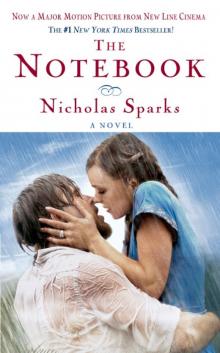 The Notebook
The Notebook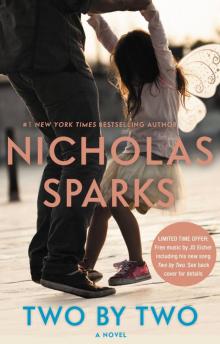 Two by Two
Two by Two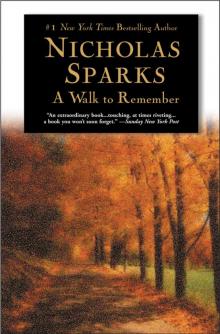 A Walk to Remember
A Walk to Remember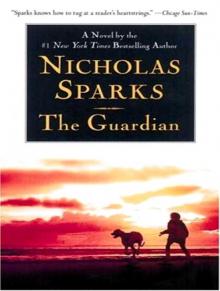 The Guardian
The Guardian Dear John
Dear John The Last Song
The Last Song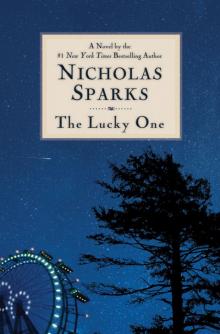 The Lucky One
The Lucky One The Wedding
The Wedding The Longest Ride
The Longest Ride Safe Haven
Safe Haven The Rescue
The Rescue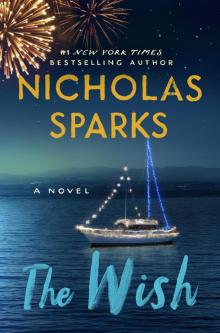 The Wish
The Wish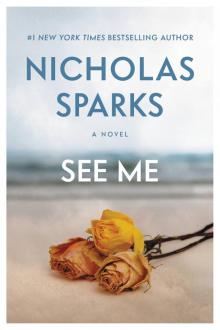 See Me
See Me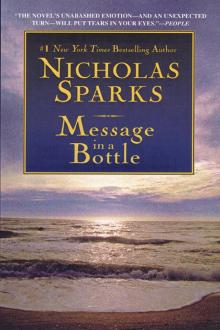 Message in a Bottle
Message in a Bottle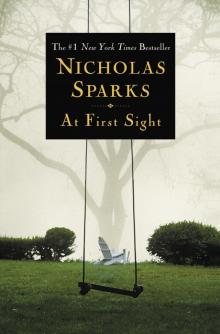 At First Sight
At First Sight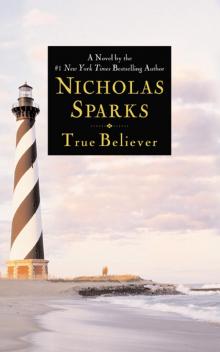 True Believer
True Believer The Return
The Return A Bend in the Road
A Bend in the Road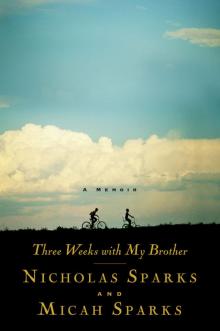 Three Weeks With My Brother
Three Weeks With My Brother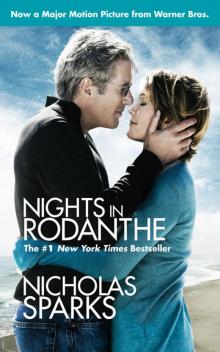 Nights in Rodanthe
Nights in Rodanthe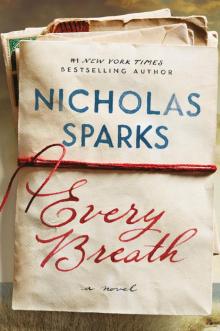 Every Breath
Every Breath